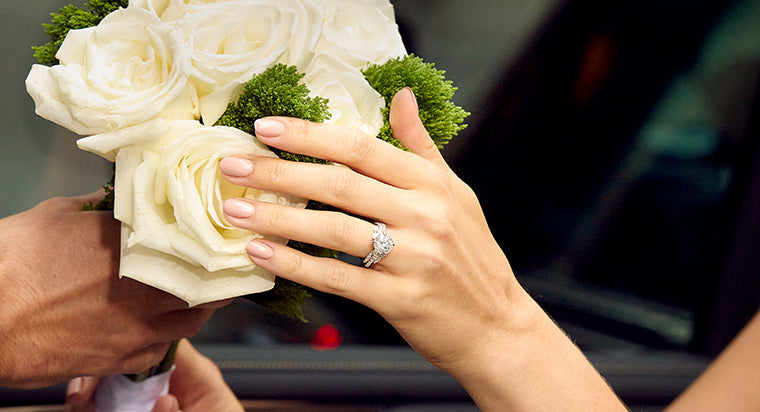Guide to Alternative Metals for Men’s Wedding Bands

In the past, your options for fine jewelry only included gold, platinum, or silver. The fine jewelry world has evolved, and so have the metal options. While these new options are amazing, they can get confusing. We gathered all the information on newer metals so you can evaluate which metal would work best for a men's wedding band.
TABLE OF CONTENTS
Alternative Metal Options
The most popular alternative metals for men's wedding bands include titanium, tungsten, cobalt and ceramic (titanium carbide). Some alternative metals are extremely scratch resistant and nearly shatterproof, which is a benefit for men who work with their hands. Some also select a second wedding ring to use as a “sports band” that is a wedding band you wear for physical activities, vacations, or other instances where you're worried you could damage or lose your wedding band. Let's discuss each of these alternative metals in detail.
Titanium
Titanium is well known as a lightweight, alternative metal for men's wedding bands. It's naturally silver-white, but it can be treated to create different colors. Titanium has the symbol Ti and atomic number 22 on the periodic table. It's hypoallergenic, inexpensive, scratch resistant, and stronger than steel but lighter than aluminum.
Its hardness makes it impossible to resize, so size carefully before you purchase your wedding band. If you have an emergency and need the ring cut off, it'll need to be cut in two places to remove it. While it is hard, you can scratch titanium rings, but you can usually polish them off.
Tungsten
Tungsten is a pretty remarkable metal. It's 10 times harder than gold or silver, 8 times harder than platinum, and 2 times as hard as steel. It's highly scratch resistant, hypoallergenic, and inexpensive. It rates as a 9 on the Mohs hardness scale, so it's extremely strong. It's unique that you can find tungsten rings in white, black, and gray.
Tungsten, (element number 74 on the periodic table), isn't used to create pure tungsten wedding bands. Instead, bands are made with tungsten carbide, which have an equal number of tungsten and carbon atoms. Tungsten carbide rings combine tungsten ore powder with various binders mixed together at very high temperatures to eventually create a polished, strong piece of fine jewelry.
Similarly, there are different types of tungsten carbide quality for jewelry. Higher quality tungsten carbide has a low amount of nickel and a high percentage of tungsten and carbon. Low quality tungsten jewelry has a lower percentage of tungsten. As a result, prices vary depending on the quality of the tungsten.
In terms of cons, it has brittle properties so it can break if dropped on a hard surface. It's so strong that the ring will need to be shattered with pressure to get it off your finger (either with a specialized tool or vise grips). Its strength also means it can't be resized. Scratches cannot be polished out either. Also helpful to note that the black or white tungsten might not be as scratch resistant as gray because of the coating used to make it either white or black.
Cobalt
Cobalt looks like white gold or platinum, so it's a popular option. The color is lighter than platinum, but it has the shiny finish of rhodium-plated white gold. It's element number 27 on the periodic table. For jewelry, cobalt gets mixed with other metals, likely chromium, to increase its durability and wear properties.
In terms of pros, it's harder than other precious metals like platinum, gold, and silver, which makes it scratch resistant. Any scratches that you do get can be polished out. Cobalt rings are about a 7 or 8 on the Mohs hardness scale. It's also shatterproof, chip resistant, inexpensive, and hypoallergenic.
In terms of cons, cobalt cannot be resized so you'll need to carefully size before purchasing. If you need the ring cut off, it'll need to be cut in two places because cobalt is so strong. It can't be cut once and bent off of your finger.
Ceramic (Titanium Carbide)
Ceramic (titanium carbide) is an alternative metal that is lightweight, hypoallergenic, and tarnish resistant. It's very hard and measures a 9 on the Mohs hardness scale, so it's highly scratch resistant.
In terms of pros, ceramic can be polished to a high shine, and it is very durable. It's strong, lightweight, hypoallergenic and inexpensive.
In terms of cons, ceramic's extreme hardness makes it impossible to resize and it cannot be cut off using standard ring cutters. In case of an emergency, you can shatter by applying pressure. Additionally, ceramic can chip or break if it's dropped on a hard surface.
A unique aspect to ceramic rings is that it's a consistent, smooth, glossy finish that can be made in different colors. You'll see plenty of black ceramic wedding bands in different finishes (matte or highly polished).
Wrapping Up
Hopefully you learned more about alternative metal options for men's wedding bands. Titanium, tungsten, cobalt, and ceramic (titanium carbide) continue to gain in popularity. Make sure you size carefully before purchasing any alternative metals in case they can't be resized. Each has advantages and unique aspects, so the choice is all yours!
FAQs
Which alternative metal is the best substitute for platinum?
Is titanium a good choice for a wedding band?
Are tungsten wedding bands durable?









